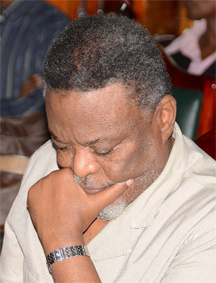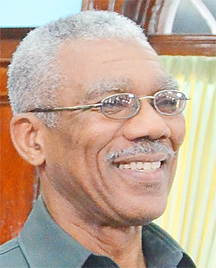New members of the Integrity Commission could be sworn-in within a week, Prime Minister Samuel Hinds announced last night as the National Assembly approved a government motion to ensure that Members of Parliament submit annual declarations in keeping with the provisions of the Integrity Act.
The motion, moved by Hinds, was approved with the support of the opposition APNU and AFC, after a number of amendments were made to it.
The National Assembly was told last evening that the life of the Integrity Commission came to an end on May 20th. Hinds said Opposition Leader David Granger and President Donald Ramotar have been engaging each other on members for a new commission, while adding that the religious community is also being engaged on the matter. He said that within a week’s time, the requisite members could be installed.

The motion urges that the National Assembly recognise the lawful and legal obligation of MPs to submit annual declarations and to call on all MPs to submit their declarations, in accordance with the law. It further called for the Assembly to declare that failure or refusal of MPs to submit declarations is a contravention of the law and a “gross indictment of those Members of Parliament and vicariously on the integrity of Parliament.”
A clause in the motion for the National Assembly to call on President Ramotar to disclose the name of defaulting MPs to the Speaker of the National Assembly and for the defaulters to be sanctioned by Parliament’s Committee of Privileges was removed. The government stated that it recognised that the request may have been ambiguous and did not object to its removal.
According to APNU MP Debra Backer, only the Integrity Commission can publish the names of defaulters and she argued that the President only has the right to publish the names of the members of the commission by law. She said that asking him to do otherwise would be asking the president to act outside the law.
Backer noted that the APNU supported the motion and its principle. “The APNU has absolutely no trouble or no problem with the principle of submitting their finances or income to a duly constituted commission,” she declared.
Backer, who moved the amendments to the motion, also inserted a clause that acknowledged that Ministers of Government and MPs were among those expected to uphold the Code of Conduct outlined in the law.

Granger, meanwhile, charged that it was the executive branch of the government that must be looked at for corruption. “When we speak of corruption… we speak of corruption on the industrial scale… we have to look at the executive,” he said. “When we look for corruption, we must look for people who are involved in a massive bogus procurement of pharmaceuticals… and we must look at government ministries which soon before they are audited they are burnt,” he added. But Speaker Raphael Trotman cautioned Granger at this point, while noting that the last government ministry fire was found to be due to arson. Granger, however, said that there was no evidence to suggest this, while adding that there were fires at other government ministries which painted a similar picture.
AFC MP Moses Nagamootoo, in his contribution on the debate of the motion, said the AFC supported the motion on the condition that the commission is made operable. He said that Hinds should have withdrawn the motion and engage Granger instead, while adding that the intent of the motion is a “political ploy” to gain political points.
Nagamootoo said that the Integrity Commission Act ensures that public officials set an example in public life and ensures that public officials do not use their position to influence the outcome of contracts as well as the misuse of state funds.
The governing party PPP/C and the PNCR – the main constituent in the main opposition coalition APNU – have in recent years been at odds over the Integrity Commission and the requirement for MPs to submit annual declarations. The government and opposition previously clashed over the issue after then-president Bharrat Jagdeo issued an ultimatum to MPs in 2009 to submit their declarations of assets and liabilities to the Integrity Commission or face criminal charges. The opposition parties, however, questioned the constitutionality of the commission and called for it to be reconstituted. Jagdeo subsequently announced that consultations would start towards resuscitating the commission.





